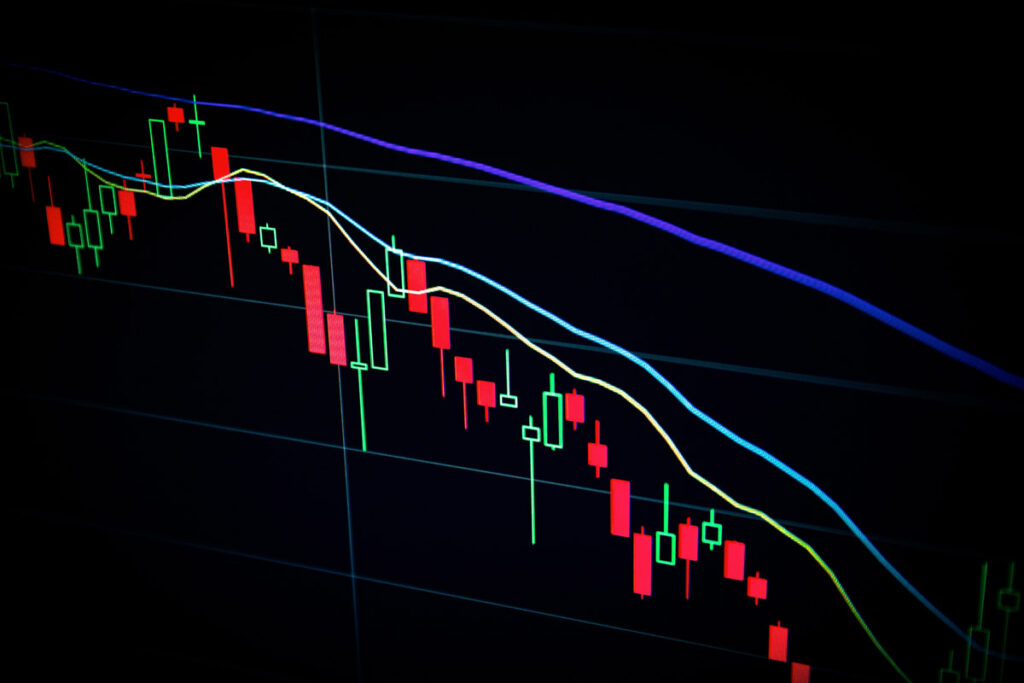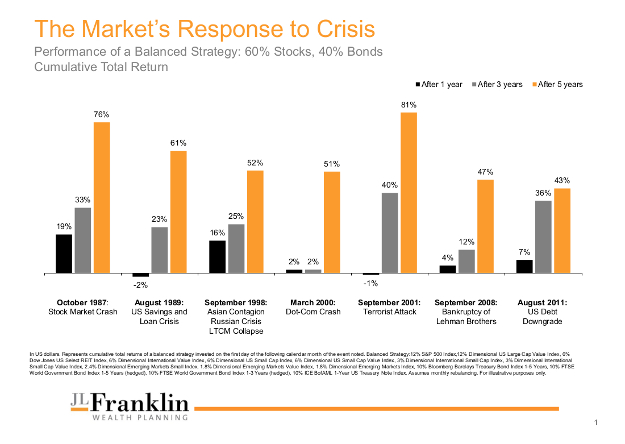U.S. stocks fell sharply on March 9, bringing us closer to bear market territory. While we don’t yet have a grasp on the human toll of the worldwide coronavirus pandemic—or the measures to halt or mitigate its spread—the markets are reeling.
I’ve seen a lot in over 25 years in the investment business, and these gyrations remind me of 1997 (the Asian Contagion), 2000 (the dot.com crash), 2001 (September 11), 2008/2009 (the Great Recession), and 2011 (the U.S. debt downgrade).
The stock market’s current state is a result of a combination of uncertainty over the coronavirus, along with a price war for oil. Market declines occur when investors reassess expectations for the future. The expansion of the outbreak is causing worry among governments, companies, and individuals about the impact on the global economy.
For instance, Apple announced in February that it expected revenue to take a hit from problems making and selling products in China1. Australia’s prime minister has said the virus will likely become a global pandemic2, and other officials there warned of a serious blow to the country’s economy3. Airlines are preparing for a sharp drop in travel4. And today the S&P 500 dropped by over 7%; it was also the first time the circuit breaker was triggered since 1997, resulting in a 15-minute trading halt. These are just a few examples.
The Market’s Response to Crisis
Markets are designed to handle uncertainty, processing information in real time. We see this happen when markets decline sharply, as they have recently, as well as when they rise. The graphic below shows how the market reacted 1, 3, and 5 years after a crisis event. Five years beyond all events in the graphic, returns are up 43% to 81%.
March 9 also marks 11 years since the market low of the Great Recession. March 10, 2009 started a bull market resulting in the average annual return for the S&P 500 and Dow Jones Industrial Average of 16.8% and 16.2%, respectively (from 3/9/2009 to 3/6/2020, per Morningstar).
No Risk, No Reward
As financial professionals, we help our clients develop a long-term plan they can stick with in a variety of conditions—including the inevitability of a downturn. Amid the anxiety surrounding the coronavirus, smart investing principles remain a strong guide.
Long-term investors have a high probability of earning inflation-beating returns over decades. This is because of the uncertainty in markets, not despite it. Riding out market ups and downs may lead to worry and stomach upset, but it’s the best way to achieve your goals and reduce stress in the long term.
Avoid Panic by Focusing on the Future
During this tumultuous time, the best way to stay on-target to meet your goals is to stay invested and avoid panicking. As your personal CFO, we advise you to keep these points in mind:
- Our firm focuses on what we can control. This includes creating an investment plan to fit your needs and risk tolerance, diversifying broadly, reducing expenses and turnover, and minimizing taxes.
- Whatever the economic scenario, over the long-term the economy will grow, and so will the corporate earnings that will drive stock prices higher.
- Financial markets anticipate the future; it may seem counterintuitive, but the time to buy is often when the outlook is particularly grim. In the past, buying during a recession has almost always been a wealth-generating strategy. For disciplined, long-term investors, this is an opportunity to buy stocks at sale prices.
- Emotion-based investment decisions are often bad decisions. During bear markets investors are more likely to make decisions based on fear. Try not to do this.
- Tax loss harvesting is a value-added service we provide. Taking or “harvesting” losses now is a sure way to offset gains (which may occur later this year), or to stockpile losses for future years and reduce your tax bill.
- An advisor is a safety net between you and the market.
Bottom Line
You can only create a permanent loss by panicking and selling out. It’s difficult to hold fast when the wheels feel like they’re coming off. If you’re in retirement, remember that you won’t spend all of your assets this year, and if you’re in the accumulation phase of life, now is a good time to add cash to the portfolio.
One of the many benefits of working with an advisor is to have access to a voice of reason during market volatility. If you would like to discuss your particular situation, please reach out to us.
Footnotes
- Apple, February 17 press release. https://www.apple.com/newsroom/2020/02/investor-update-on-quarterly-guidance/
- Ben Doherty and Katharine Murphy, “Australia Declares Coronavirus Will Become a Pandemic as It Extends China Travel Ban,” The Guardian, February 27, 2020. https://www.theguardian.com/world/2020/feb/27/australia-declares-coronavirus-will-become-a-pandemic-as-it-extends-china-travel-ban
- Ben Butler, “Coronavirus Threatens Australian Economy Reeling from Drought and Fires,” The Guardian, February 5, 2020. https://www.theguardian.com/business/2020/feb/05/coronavirus-threatens-australian-economy-reeling-from-drought-and-fires; Ed Johnson, “Australia Says Economy to Take ‘Significant’ Hit from Virus,” Bloomberg, February 5, 2020. https://www.bloomberg.com/news/articles/2020-02-05/australia-says-economy-to-take-significant-hit-from-virus
- Alistair MacDonald and William Boston, “Global Airlines Brace for Coronavirus Impact,” The Wall Street Journal, February 26, 2020. https://www.wsj.com/articles/germanys-lufthansa-makes-cuts-as-it-braces-for-coronavirus-impact-11582712819
The information in this document is provided in good faith without any warranty and is intended for the recipient’s background information only. It does not constitute investment advice, recommendation, or an offer of any services or products for sale and is not intended to provide a sufficient basis on which to make an investment decision.






